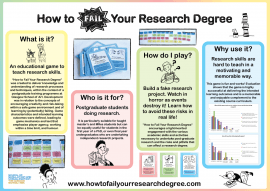This blog was originally posted on the former Higher Education Academy website.
I can honestly say that I didn’t know how interested I was in teaching methodologies until I undertook training leading to an HEA Fellowship. As a direct result of this process I not only have developed a game-based teaching intervention now being used in at least ten countries, I have a new and fruitful research strand to follow.
I’m an interdisciplinary researcher and my teaching is focussed solely on research skills development in a postgraduate context. What I didn’t know then (but I do now!) is that, despite their importance at postgraduate level, research skills courses are acknowledged within pedagogy literature as being difficult to teach in a way that is meaningful, satisfying, and engaging for students. “The common finding among scholars is that students find methods classes ‘dry’ and ‘irrelevant’, leading them to not engage with the material as much as they would with a topic-based course.” [1] Furthermore, updating research skills from the undergraduate to the postgraduate context is a neglected area of pedagogy research, evidenced by recent work within the Student Transitions enhancement theme run by the Quality Assurance Agency for Higher Education.
I learned all this because I was encouraged to do a PG Certificate in Learning and Teaching by the incredibly supportive L&T team at The Glasgow School of Art, a course which lead to HEA Fellowship accreditation. As I really enjoy teaching but have no formal teaching qualifications, I seized this opportunity to reflect on my teaching practice and develop an intervention aimed at improving the delivery and impact of research skills training. The further reflection and reinforcement enabled by the HEA Fellowship application process was also really important, not only for the Fellowship itself, but to advance activity that has become a major theme for my ongoing research activity and (I hope!) has had a significant impact on my students and beyond. This activity centres around the teaching intervention developed and assessed as part of my preparation for Fellowship application, an educational game called How to Fail Your Research Degree.
Although relatively new to teaching the research skills course, my own experiences reflected the challenges I later identified in the literature, namely that my existing (lecture-based) teaching activities were not as memorable, engaging, or motivating as they could be. A number of studies have identified the positive effects of constructivist interventions for research skills training (and other higher order learning outcomes); within my study towards Fellowship I focussed on game-based learning and developed a prototype face-to-face game to give students an overview of the processes and risks involved in a Master’s research project. I investigated appropriate evaluation methodologies for this game and tested it with my own students. The Fellowship application process provided further space for reflection… and that could have been that. However, I was now hooked on improving teaching – for my own students and beyond! The extremely positive early evaluation results inspired me to develop the game further, and because of new knowledge gained from the PG Cert course and application process I knew exactly how I could improve it.
Two years on, How to Fail Your Research Degree is a finished game which is available (for free) from http://howtofailyourresearchdegree.com/ and has been thoroughly evaluated with published results. It won a Best Serious Game award at the Joint Conference on Serious Games [2] and is a regular feature in research skills training for Masters and doctoral students at GSA. The impact of the game is also growing, at the time of writing over 60 other tutors in at least ten different countries have accessed the game for use with their own students. But, outside the immediate context of this intervention, the Fellowship opportunity has really inspired me in new directions, not only in increasing active learning through my teaching practice (ask my students about how I get them to use their mobile phones in class!) but also in my research. Linking pedagogy with my other research interests has given me major new strands to pursue and opened up genuinely exciting and innovative avenues for investigation.
In short, an HEA Fellowship application is not just a box to tick. With the help of a very supportive institution, this process provided me with the opportunity to create genuine improvements to my teaching which has benefitted not only my students but hundreds of others, as well as positively impacting my research career.
[1] Ryan, M., Saunders, C., Rainsford, E., & Thompson, E. (2013). Improving Research Methods Teaching and Learning in Politics and International Relations: A ‘Reality Show’ Approach. Politics, 34(1), 85 – 97.
[2] http://blog.gsofasimvis.com/index.php/2015/06/10/dds-researcher-wins-serious-games-award/
